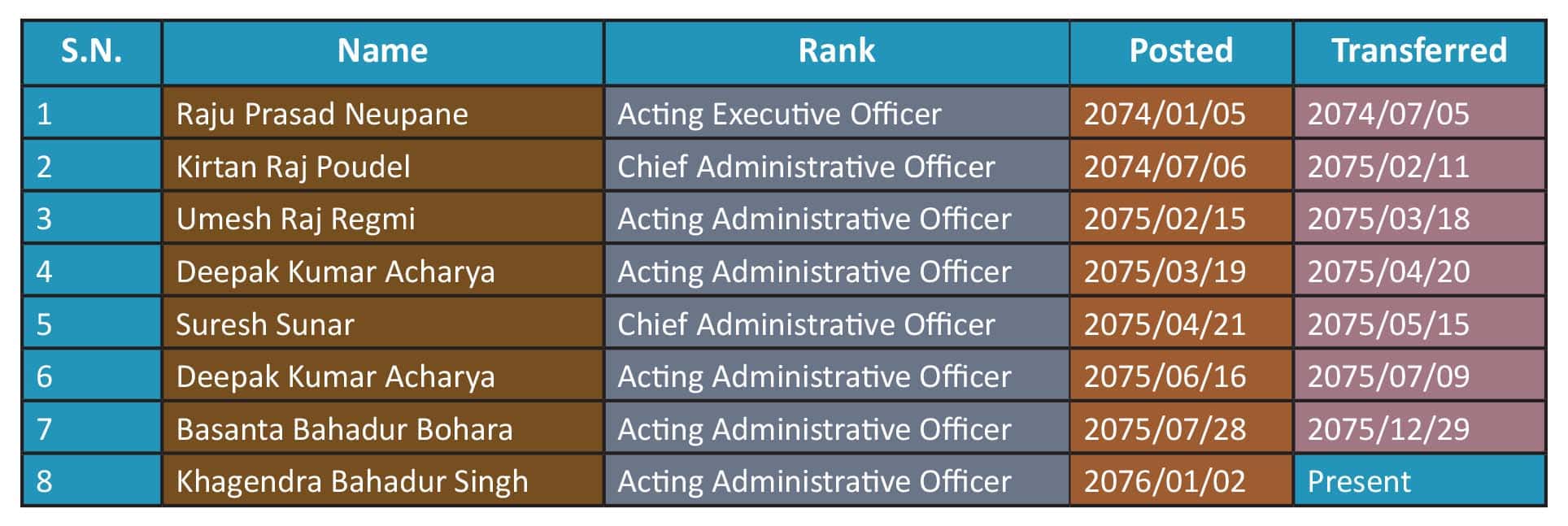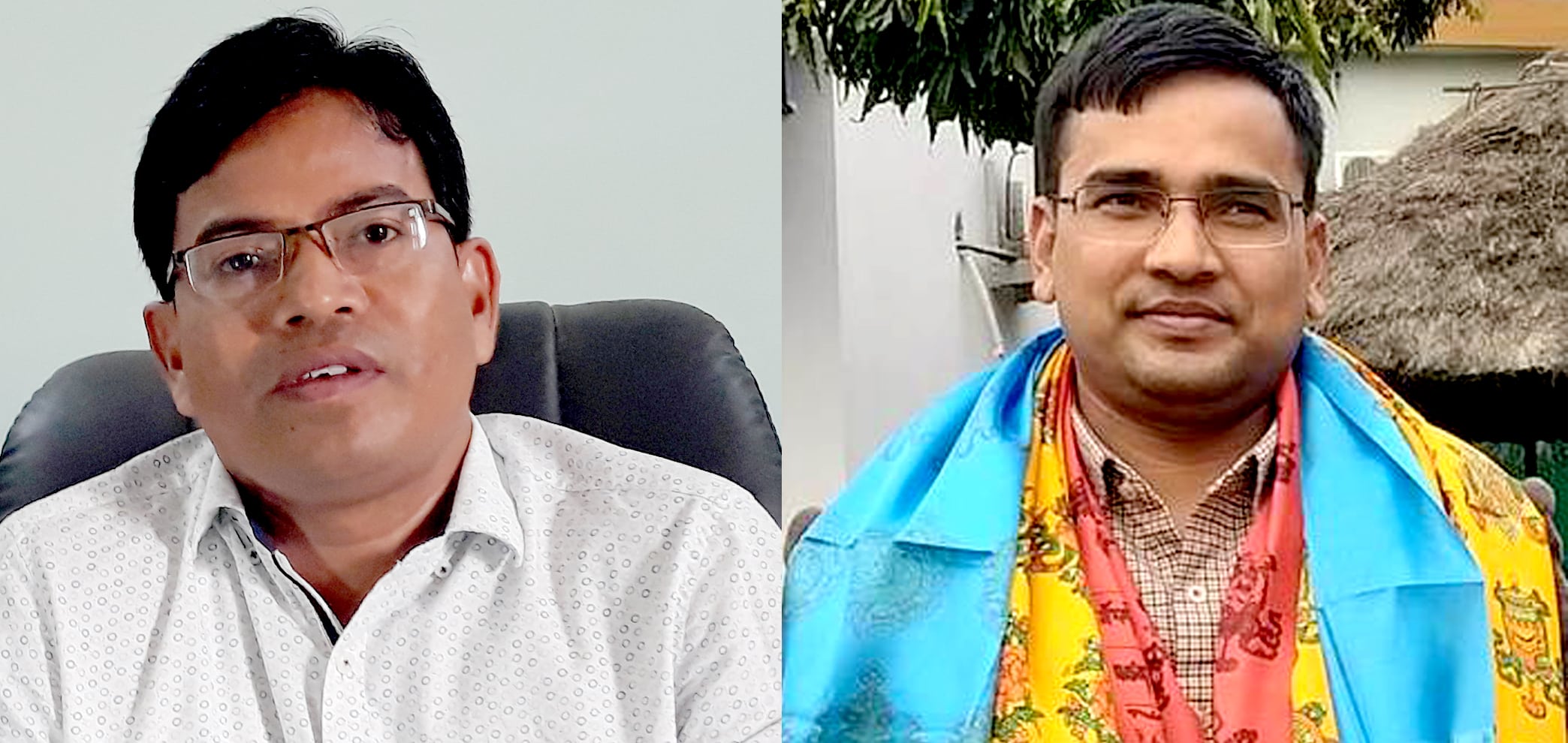In the last one year and half, chief administrative officers have been replaced eight times in Ghodaghodi Municipality of Kailali district. The high staff turnover has had an enormous impact on the service delivery and infrastructure works of the municipality.
Krishna Adhikari, Centre for Investigative Journalism-Nepal
Eight chief administrative officers have been transferred in one-and half years at Ghodaghodi Municipality of Kailali district. On April 15, 2019, Khagendra Bahadur Singh was posted as chief administrative officer. But, he is not sure how long he will remain here. In the local polls held in 2017, the CPN (Maoist) leader Mamata Prasad Chaudhary was elected as the Mayor of Ghodaghodi Municipality. Raju Prasad Neupane was the chief administrative officer at the time. Since then, eight chief administrative officers have served at the municipality.
Ghodaghodi: tenure of officials.

Source: Ghodaghodi Municipality, Kailali
According to Civil Servant Act of 1993, government employees can be transferred only after serving one and a half years in the hill and mountain districts and at least two years in Tarai. However, Ghodaghodi Municipality has violated the provision.
Kirtan Raj Paudel was posted as Neupane successor in October 2017. No one knows why Neupane was replaced by Paudel. But Paudel, who comes from Pokhara, said the heat was unbearable for him so he got transferred to Palpa in less than six months. Soon after, Umesh Raj Paudel, a teacher who also worked at the municipality, was appointed as a caretaker chief administrative officer. However, his tenure didn’t even last for a month. He was replaced by Deepak Acharya was appointed and Paudel returned to his old job.
Acharya served for one month. He was followed by Suresh Sunar. But Sunar lasted only for two months and was succeeded by Acharya as the caretaker chief administrative officer. Acharya was freed from the responsibility on October 26, 2018 after the authorities started investigating him on the charge of irregularities.
For the next three weeks, the Municipality was bereft of its chief administrative officer. On November 14, 2018, Basant Bahadur Bohara became the chief administrative office. Bohara remained in the job for five months. On April 12, 2019, Khagendra Bahadur Singh, an Under Secretary of the municipality’s Education Section, was appointed. “It was my first posting after I was promoted to Under Secretary. I had worked outside Kathmandu for a long time. So, I wanted to go back Kathmandu. After I was offered to be transferred to the home ministry, I accepted it,” said Sunar, who served here for two months.
Mayor’s interference
According to Civil Service Act, an employee can be transferred to other offices upon requirement. But these provisions have been used to transfer officers to lucrative and convenient places. The municipality has been the victim of this trend. Lal Babu Pandit, the Federal Affairs and Local Development Minister, said the turnover of administrative chiefs was due to the transition from the old to the new system under federal structure.
Whatever the explanations, Mayor Mamata Prasad Chaudhary is believed to have been behind the frequent transfer of the Chief Administrative Officers in the municipality. Because of his involvement in some controversial issues, officials don’t want to be associated with the municipality. Those who have been posted here would leave soon after. “Cautious about being embroiled in controversy related to the Mayor, most officials get transferred from there,” said Sunar.
On March 8, 2018, when Radha Chaudhary, a teenager, was tortured after being accused of a witch, the incident sent shockwaves among local people. Ram Bahadur Chawdhary, a local shaman, had tortured Radha, accusing her of practicing witchcraft. That video of the incident went viral online.
After the incident, police arrested and detained Ram Bahadur at the local police post. Mayor Mamata Prasad Chaudhary lobbied to get him released. Eventually, Ram Bahadur was released from custody. According to Dinesh Bista, a Police Inspector, Ram Bahadur was released and handed over to ward chairman Prem Rakaya, Radha’s father Jokhan Choudhary and Mayor Chaudhary. The pressure to punish him mounted again, which forced the police to arrest him again.
On June 31, 2018, Kailali District Court convicted Ram Bahadur for the crime. He was sentenced for five years and fined Rs. 1 lakh. This case embroiled the mayor in further controversy. It also caused negative impression towards Mayor Chaudhary and the municipality. The mayor has said he hadn’t helped Ram Bahadur get his release from jail. After the incident, civil servants have been reluctant to move to the municipality, according to knowledgeable sources.

Mamta Prasad Chaudhary, Mayor and Suresh Sunar, Chief Administrative Officer
Mayor Chaudhary was shot near his house on March 12, 2018. He was seriously injured and was airlifted in an army chopper from Kohalpur Medical College in Banke to Teaching Hospital in Kathmandu for further treatment. Chaudhary recovered after a month of treatment at Teaching Hospital in Kathmandu. Police have arrested four Maoists cadres of Biplob-led group over the shooting.
The incident increased sympathy towards him. Chaudhary, who had earned notoriety after the case of witchcraft, suddenly began to be liked by people. But the gunshots on him raised fears of violence in the municipality. Civil servants lived in the shadow of fear after the shooting.
Mayor Chaudhary has let his relatives benefit from his decisions at the municipality. On 11 January, 2018, he appointed his brother Dayaram Chaudhary as the Vice President of the Greater Ghodaghodi Lake and Tourism Development Board. He courted controversy after the appointment, which comes with a monthly salary of Rs. 30,000.
Mayor Chaudhary’s controversial work is not limited to this. He has allowed his nephew, a local contractor, Prem Chaudhary to bid municipal tenders and win them. He has benefited from many municipal contracts for construction. “I have completed the process and got the contracts after due process,” he said.
The office of the Ghodaghodi Municipality lies along the East-West Highway. It is about two to three hours’ drive from Nepalgunj and Dhangadhi, two major towns. It is neither remote nor does it lack basics for food and accommodation. Still, government officials do not last here for long. Umesh Raj Regmi, who served as the chief administrative officer at municipality for a month, said: “Mayor Chaudhary doesn’t have skills to manage works of the staff and coordinate among them. His style of work, in which he doesn’t consult anyone, has caused the departure of many chief administrative officers.”
The chief administrative officer of the municipality is also responsible for municipal parliament and also serves as an executive secretary. Mayor Chaudhary acknowledges the fact that rapid transfers of officers have hurt the work and service delivery. Around 80,000 people live in the 11 wards of the municipality, which is largest in the district. “It has affected many of our works,” he said.
Both Deputy Mayor and ward chairpersons are upset with Chaudhary. Several ward chairpersons have accused him of monopoly while formulating municipal policy, programs and budget. On June 30, 2018, nine ward chairpersons jointly protested against Chaudhary’s working style. In their statement, the group had accused Mayor Chaudhary of imposing authoritarianism in the municipality, self-centeredness and favoring his relatives. Hari Raj Bista, chairperson of Ward 2, said Chaudhary’s actions had forced them to protest jointly. Meanwhile, Man Raj Shahi, chairperson of ward 1, has dubbed the mayor ‘a king without a crown.’
Due to the lack of staff, a secretary has been overseeing ward 3, 5 and 7. Similarly, one secretary is running ward 2 and 6, 4 and 9 and 10 and 11. When one secretary has to oversee 2-3 wards, service delivery and construction has been suffered, according to ward chair Bista.
Ghodaghodi Municipality is home to the largest number of community forests, freed kamaiyas and poor communities. “People have yet to feel the presence of local government because of the frequent transfers of officers,” Bista said.



